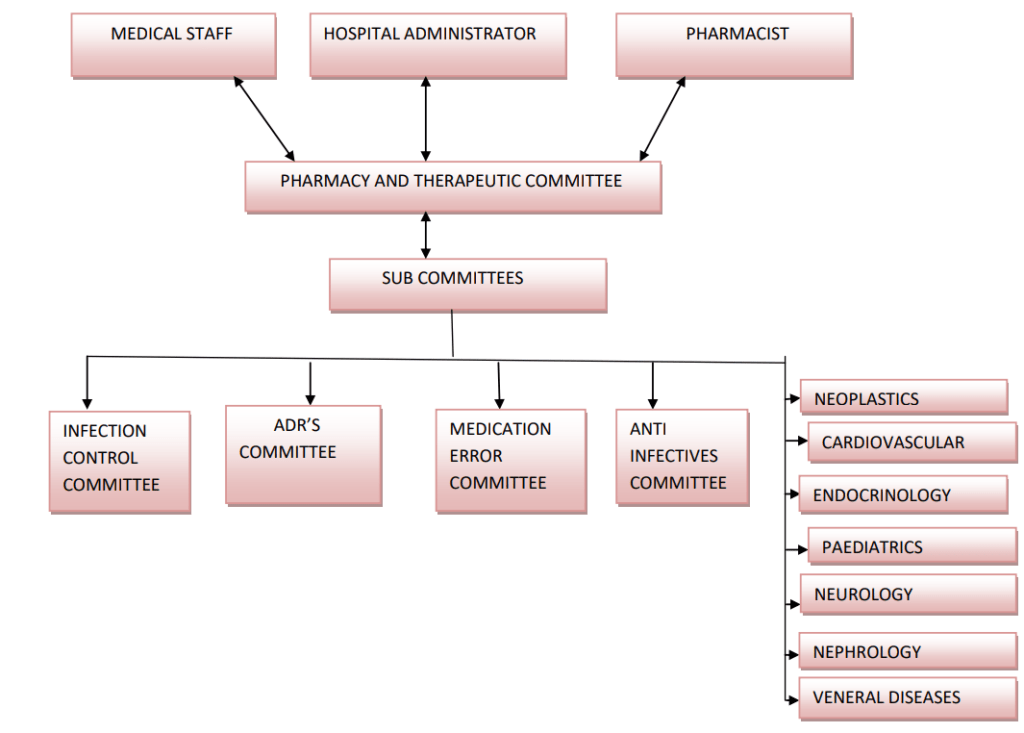Table of Contents
Definition:
The pharmacy and therapeutics committee is a policy recommending body to medical staff and administration of an organization on matters related to the therapeutic use of medicines.
It serves as a line of communication between medical staff and the pharmacy department to ensure rational use of the medicines.
Objectives
1. Policy Development:
The committee formulates documented rules and regulations related to medicine management including formulary, standard treatment guidelines, etc.
2. Education:
The committee assists in conducting education programs, audits, medicine utilization reviews, monitoring ADRs, medication errors, feedback, etc.
3. Advisory:
The committee recommends adopting policies regarding the evaluation, selection, and therapeutic use of the medicines.
4. Drug Safety:
The committee conducts deep evaluations of drug availability, drug protocol changes, ADRs, interactions, bacterial resistance, and cost.
Functions And Scope:
- To establish standard therapeutic guidelines regarding the treatment of disease on consultation with the medical staff.
- To establish a formulary and procurement of drugs in a cost-effective manner.
- Establish procedures for cost-effective drug therapy.
- To make recommendations regarding drugs to be stocked in patient care areas.
- To develop training programs for staff on effective drug use.
- To review adverse drug reactions.
- To participate in quality assurance programs related to the distribution and administration of drugs.
Organization of Pharmacy And Therapeutic Committee (PTC)
- It may vary from hospital to hospital. The committee mainly consists of Three physicians from each super specialty.
- A chairperson among physicians was elected.
- Chief pharmacist as secretary.
- Senior nurse.
- Hospital administrator.
- Drug information specialist.
Operating Procedure:
The committee should meet six times a year at regular intervals and emergency meetings if required.
The committee can invite its meeting persons within or outside the hospital.
The agenda and supplementary materials are prepared priory by the secretary and supplied to the committee members. The agenda includes:
- Minutes of previous meetings.
- Review of contents of hospital formulary
- Information regarding novel drugs and their delivery systems.
- Review of current investigational drugs and their procedures.
- Review of ADRs, interactions, side effects, toxicities, etc.
- Report of the medical audit.
- Reports of various subcommittees.

Role of Pharmacist in Pharmacy And Therapeutic Committee
The roles and responsibilities are:
1. Advisory To Medical Staff, Administration & Pharmacy:
He along with PTC is a valuable resource who can provide advice to medical staff, nurses, administrators, pharmacy, and other departments of the hospital on all the issues, policies, and guidelines.
2. Development Of Drug Policies:
He along with PTC develop drug policies in
- Pharmacological basis for inclusion and exclusion of medicines from formulary.
- Standard treatment guidelines for physicians.
- Restricted and Rational use of medicines.
- Use of narcotic and rational use of medicines.
- Promotional literature.
- Evaluation of drugs safety and efficacy.
3. Role In Management Of Medication Errors:
Medication errors are due to a lack of knowledge, overload of staff, poor policies, unfamiliar dosage forms, human errors, lack of procedures, etc. The possible errors occur either in prescribing, dispensing, or even in the administration process.
The areas to be focussed are:
- Prescribed medications are not dispensed.
- Wrong dosage or wrong strength.
- Wrong route of administration.
- Improper frequency (or) time of administration
- Improper rate of administration.
- Medications were given to the patient with a known allergy.
4. Role In Monitoring ADRs And Safety of Medicines:
ADRs present a major threat in terms of mortality and morbidity and avoidable treatment costs.
They are mainly due to pharmacological actions, drug interactions, irrational drug combinations, and substandard drug qualities.
The role of the committee is to:
- Evaluation of patient’s pathological conditions and medication history.
- Monitoring and evaluating, resolving medication errors.
- Reporting suspected ADRs to the manufacturers and other authorities.
- Evaluating suspended adverse drug events.
5. Selection of Medicines For Formulary:
Medicines are selected on the basis of STGs that have been adopted for use in hospitals. Documented evidence for efficacy, safety, quality, and cost should be considered for inclusion. Periodic reviews are necessary for inclusions and eliminations.
6. Development Of Standard Treatment Guidelines:
He should choose a proven way to promote the rational use of medicines. This is done by:
- Developing an interactive way involving end users.
- Easy to read and update things.
- Introduction with formal launch, training, and supervision.
7. Development Of Emergency List:
PTCs and pharmacists need to prepare boxes containing emergency drugs that should be available readily for use at the bedside. A list of such drugs should be compiled by the committee.
It is essential that these are checked on a periodic basis. e.g.: Aminophylline 0.25g/ml, atropine sulfate 0.4mg/ml, cal gluconate 1gm/10ml, heparin 10000 units/ml, potassium sulfate 20mg/ml.
8. Role In Drug Utilization Review:
Drug utilization includes prescribing, dispensing, administering, and ingesting of prescribed drugs.
Things that are to be taken care of are:
- Medications are taken before admission, during hospitalization, and with home remedies.
- To detect drug-induced diseases
- To help in detecting drug toxicities.
- To detect and prevent any preparation incompatibilities.
LIMITATIONS:
- It is confined to only one hospital.
- In formulary it gives an opportunity of only approved drugs.
- High range of maintenance.
- Novel drug delivery systems and cost-effective drugs cannot be handled without prior approval of PTC.
- Technical staff availability is required.
Make sure you also check our other amazing Article on: Patient Medication Adherence
